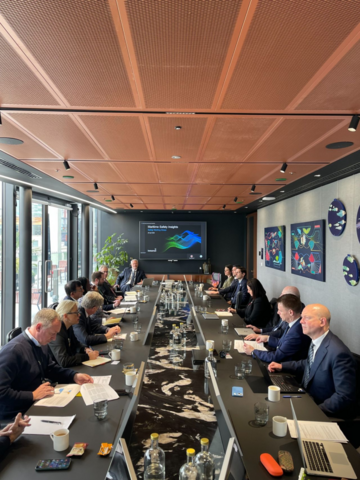
Working group aims to provide deeper insight into key maritime safety issues by sharing and combining the data that can help improve industry-wide standards
Inmarsat Maritime, a Viasat company, supported by Maritime London, have established SEA-CARE as a new working group of stakeholders from industry, regulators, and the UK government whose goal is to scrutinise maritime safety and how pooling information can improve it.
The new working group establishes Maritime London as an impartial broker to ensure that the right organisations are represented in SEA-CARE discussions between Inmarsat and industry stakeholders. Jos Standerwick, Chief Executive, Maritime London is chairing the group alongside Inmarsat Maritime’s Vice President of Safety & Regulatory, Peter Broadhurst.
The collaborative initiative sees data sharing as key to developing a better understanding of maritime safety challenges and how to overcome them. One inspiration has been Inmarsat Maritime’s annual The Future of Maritime Safety report, which analyses Global Maritime Distress and Safety System (GMDSS) call records, and is now in its sixth year of accumulating data. SEA-CARE stakeholders see this vital record of real incidents involving perceived danger as a powerful example of a dataset which, combined with other relevant data, could contribute to significant new insights into best safety practice.
“While distress call data provides valuable information, the reasons the calls are made are not always clear from the data,” said Peter Broadhurst. “The volume of calls year on year is persistently high, and a high proportion also turn out to have been unnecessary. If we enriched GMDSS data with this information, for example, our industry could implement preventive measures to reduce the call volume.”
A first meeting of the group brought together experts representing the London & International Insurance Brokers’ Association, the International Maritime Rescue Federation, the International Maritime Organization (IMO), and the International Transport Workers’ Federation. Together, the attendees evaluated how other datasets could be integrated to provide a more holistic view of maritime safety, including information from flag states, the IMO, insurance brokers, and shipping companies.
In acknowledging that organisations may have concerns over sharing sensitive data, the group agreed that anonymised information could be used retrospectively to achieve the goals of the SEA-CARE initiative. According to the attendees, anonymised historical data would lose its potential for reputational damage while retaining its value as a source for analysis.
Jos Standerwick commented: “This conversation has been important because it has shown the scale of the challenge when it comes to sharing the appropriate data to create a better and more objective overview of maritime safety. However, importantly, we have also established that stakeholders are willing to engage fully with that challenge.”
SEA-CARE committee members made plans for the next session in early 2025, in which they intend to nominate a top five list of safety issues facing the industry and decide which organisations to approach about sharing data with the stated goal of gaining insight into safety risks.





